I am often asked how I manage my banking when I have no fixed home. It has been something of a non-issue for me. It seemed simple and straightforward, so much in fact that I wasn’t going to write an article about it at all. But after speaking to some friends, I realized that banking depends heavily on where you have your bank, and that I have been fortunate to have Swedish and UK banks. Other countries are harder to deal with.
So here is what I want to do with this article. I will outline the important things to look for when setting up your international banking solution, and I will use some personal examples to illustrate how I’ve implemented my own advice. Then you can complement the article with your own solutions for gaining access to your funds when abroad in the comments. Together, we can map out the best way to do nomadic banking, no matter where you are from.
Credit Cards
Credit cards should be your primary way to pay for stuff, even if you have no need for the actual credit. Most cards charge no interest on your credit as long as you pay your balance each month, something you can set up to happen automatically, drawing from your bank account.
What you get in return is a buffer between your bank account and potential thieves and other scoundrels. If your card is stolen or cloned, then you can challenge these charges. This is much harder to do if they’ve used a debit card and the money has left your account already, not to mention that you will be out of pocket until the fraud has been resolved.
You also get a better credit rating by having and using a credit card than a debit card. The credit agencies need to be able to see a history of you gaining and clearing debt. Then they like you. If you never rack up any debt, then you have no history, and your rating will fall short.
Credit card transaction can also earn you air miles and thus buy you cheaper flights. There is a whole science to this which I have never bothered reading into since I fly via my Airline Patron’s stand-by tickets. But please share your air miles collecting tips in the comments!
The major traps with credit cards are the fees. Not all cards are created equal! As a nomad, you do not want a card that is going to slap any kind of extra fees for using it abroad. (Once, I bought a coffee abroad and found out later that the fee was more expensive than the coffee!) These fees rack up quickly, and there is no need to accept a card like that. Shop around and you are bound to find one that does not screw you over.
Another trap is the ubiquitous travel insurance that comes with most credit cards. Read the fine print! Most of these insurances are valid for shorter trips only, usually up to forty days. For nomads, these travel insurances are next to useless.
Personally, I use a Swedish Nordea Gold card. No fees, no hassle.
Cash
Gone are the days when you had to exchange travel money before you left home. And please don’t embarrass yourself with traveller cheques. Today, the first thing you do as you arrive at an airport is to track down an ATM and simply withdraw some cash.
To do this, you need a debit card linked to your bank account at home. Withdrawing money from ATMs is the only thing for which you should use this card! Unless you are going to the ATM, leave the card safely at home. Credit cards are much safer to use as they have better protection against fraud (See above) and losing your debit card means losing access to your cash. Cash is king, so don’t get de-throned by some pocket-fingering trick in a club!
Most debit cards will rob you blind every time you use it to withdraw money abroad. As international law stands today, you can’t sue the banks for this. (Vote for me as your world tyrant and I’ll change that!) So don’t bank with robbers. There are debit cards out there that will not charge you any fees for using foreign ATMs.
Personally, I had to switch bank to find a debit card with no foreign transaction fees. I now use a UK Santander Zero Account debit card. If you know of a debit cards with zero fees for withdrawal abroad, let us know in the comments!
Bank Accounts
Even if your debit or credit card have no fees for foreign transactions, they will still do a currency exchange every time you use it. Each such exchange is an opportunity for the bank to screw you on the exchange rate, and they will. It is not a huge amount, but still, the fewer currency exchanges your money goes through, the better.
There is no good way to get around this, however. If you hold your funds in British Pounds, and you live in the US, at some point, you will have to exchange it, be it through a credit card purchase or an ATM withdrawal.
If you spend a lot of time in a country, then it is worth opening up a bank account there. If you earn money in that country, or if you are given money in that currency, then you can save it away in this new bank account and draw upon it later, saving your money the expensive round-trip to your ‘home’ country and thus two currency exchanges.
My personal example of this is the United States. I love the US, and I go back there two-three times a year. My Airline Patron lives in the US, and I often pay him money, in US dollars. I also have US clients who pay me US dollars. As much as possible, I keep all my dollar activities within the US borders, and thus save money by not having to convert them to British Pounds or Swedish Crowns. This is all possible because I opened a Bank of America account in the states.
Your ability to open a bank account varies wildly by country. Some countries (such as the US) only requires that you have a domestic address (which can be a friend’s address) while other countries are much stricter.
Does your country invite foreigners to open bank accounts, or is it prohibitively difficult? Let us know in the comments.
Internet Banking
PayPal has become something of the de-facto standard of internet banking. PayPal allows you to hold multiple currencies under one account, so this is a way to avoid making currency exchanges when you are paid or sent money in a foreign currency, and later pay or send some money to someone else, in the same currency.
However, PayPal comes with their own fees, and they can be difficult to understand. They also have a bad reputation of freezing assets for the flimsiest of reasons and without you having any say. There is a large mob of angry customers brandishing grievances against PayPal for seizing their money.
I still use PayPal when accepting payments from people in countries where I don’t have a bank account, but I try to keep as few of my eggs in this particular basket as I can.
PayPal is not the only internet ‘bank’ out there. (It is not actually a bank; it is registered as a ‘money service’.) Lately, there have been several companies popping up stating that they want to end the tyranny of plastic cards (and their expensive transaction fees) and instead create an internet currency which transcends borders. The most famous right now is BitCoin.
To me, this sounds like an interesting idea, but none of these services have given me reasons to believe that they are not fully staffed by unicorn-riding hippies. For now, I’m not putting a single egg in any of those baskets.
Renewals
Keep track of when your cards expires!
When I was geo-static, I would normally notice that my old debit card was about to expire only when the new card arrived in the mail. As a nomad, you need to be more mindful. I’ll assume that when you left your home, you changed your mailing address to a friend. And I will also assume that you return there once in a while? Well when you do, check your cards from that country. If they expire before you think you’ll return, ask for another card to be sent to you!
Remember that these cards are your lifeline to your funds. You don’t want them to expire while you are living in another country. Neither do you want to lose your card or have them stolen! I have not had to replace a card while abroad, but I can imagine that it is a serious hassle. If you have experience in replacing a credit or debit card while abroad, please tell us about it in the comments.
Another kind of renewal that you’ll need to keep an eye on when living nomadically (nomadionic?) is the “please don’t block my card for suspected foreign use” status. Different cards have different rules for when it’s flagged (and therefore blocked) when used abroad, and it is up to you to find out how to deal with it. Call you credit card’s customer services!
Some cards are blocked if they are suddenly used in a different country. A simple trick to keep your cards from being flagged by these rules is to buy something at the airports both before and after your flight.
Other cards require you to call the card’s customer services and state in advance that you intend to visit another country. Usually you can only log trips a few months ahead. Ask them when you’ll need to call them back to extend your trip clearance and make a note in your Getting Things Done system to remind you to make that call, or risk standing at the grocery store with bags full of food you can’t pay for.
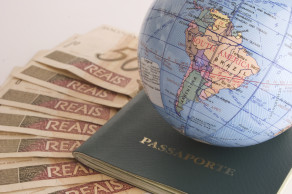
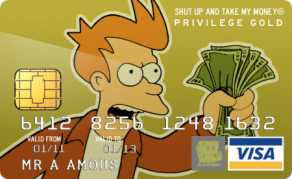
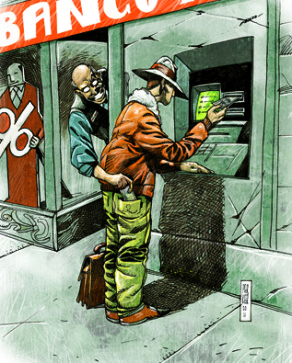
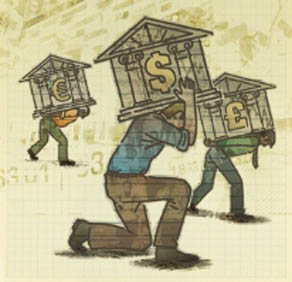

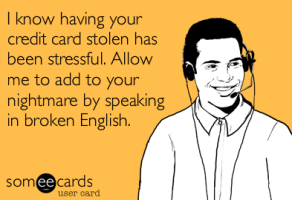


I had a somewhat fraught experience with my credit card being blocked whilst in the US a couple of years ago. I’d checked out of a hotel in Santa Monica where I had been staying and settled the bill using my credit card. That same day I moved on to a hotel in Downtown LA, on checking in I was obliged to produce my card for booking confirmation, only to be informed that it was unable to be processed. This involved my having to telephone my credit card provider in the UK, who informed me that the card had been blocked due to multiple cash requests being made for exorbitant amounts of US dollars. I could only presume that my card had been scammed at the Santa Monica Hotel. What to do now? After lengthy security and identity checks over the phone, the credit card provider agreed to unblock the card whilst the hotel receptionist made the charge. It failed six friggin times! This proved to be a complicated timely affair as I had to ask the receptionist each time to process the card almost to a split second before the card was automatically blocked again. This was becoming a nightmare, I had relied on my credit card for paying my hotel bills, I was using my debit card for spending money only and I had two more weeks left of my holiday, which I was beginning to envisage spending on the streets of Skid Row! Thankfully, the card went through on the seventh attempt and my bill was paid – what a relief!
I have to say that in this instance, I was grateful for my credit card provider’s astuteness, the situation could have been a lot worse had they not taken any immediate action. The only damage done was temporary (albeit a lengthy) overload to my nervous system, which soon recovered with a few celebratory cocktails!
Good post to keep in mind for future travels… when I can hopefully get out of the states again! I don’t doubt how bad my bank would cheat me though.
I use the UK bank Metro Bank. They have no foreign transaction fees, take no commission on exchanges, use the true underlying Mastercard exchange rate for currency exchanges, and do not require advance warning of international travel to not block my card. They also have branches that are open outside of usual banking hours, and a bunch of other great services (like UK-based call centers, that AREN’T on an 087 or 084 number!)
I can’t recommend them enough. I do not use them as my day-to-day bank account, only when I’m travelling, so I transfer in only what I intend to spend (or on longer trips, I may do this in portions, so I get an early warning if I’ve blown through it too fast). This gives me similar protections to using a credit card.
I lost Metrobank debit and credit card in Laos. They wouldn’t send the cards to me abroad and they lost them in post as they were sending it to my registered address in the UK which is now forwarding to a friend’s place. One month later no cards, only PINs and hence no chance for me to get them any soon as I am travelling for a year and soon will have no fixed address to send the cards to by my friends. The staff gave some idiotic answers that it is against Data Protection Act to send cards abroad….
not a world traveler,YET, but have had enough bad experiences within the states to last a lifetime. San Francisco, June 2012, after four days of car travel, hotel said no funds in bank account. YES, DAMMIT , money is there. Had carefully laid out financial plans. Frantic calls to bank back home,luckily still open even with two hour time difference. Had been assured at small branch of bank we did not need to extend our $$$$ limit, did anyhow, and they still screwed us over. Bless the hotel desk person who believed us and waited patiently for it to be resolved. In my personal opinion, banks SUCK. Incompetent people make even the most mundane issues into nightmares.
As a flight attendant, I too have had my credit card stopped for “suspicious” activity. It just looks strange to Mr. Computer that I got gas for my car in Traverse City, MI, had a salad in Chicago later that day, went out to dinner in London the next day, and charged for a hotel again in Chicago within hours. And my credit card is from American Airlines Credit Union!!! I spent about an hour on the phone with an agent loading up my account with *travels abroad frequently* notices and they had the computer just note strange activity on my card instead of stopping it entirely.
By the way Gustav, got your check! 😉
To open a bank account in Holland, you need a job or BSN number. The latter was no easy matter for me to obtain here as an American expat, but I have it now. In Amsterdam, most people pay with a Dutch pin debit card…internat’l credit cards are not widely accepted.
It would be also good investigating what your bank is willing to do in case of you losing your credit/debit card. Will they send you a card abroad? Metro bank, which is one of those that has 0% commission on your international withdrawals will not send you the card to any other address than your registered UK one. This could really screw you in a middle of nowhere without funds, which is also very important to carry a few debit and credit cards with you when you travel…
Excellent article Gustav! Love your blog…
Nice article 🙂
but here is a daft question… do you have an international bank account? or local bank accounts with UK banks, since for the latter dont you need a home adress in the UK?
True, and I’m using a friend’s address as my C/O address. And I’ve converted my bills and statements to electronic ones, so the only mail that ever gets sent to my friend is when I get a new card sent out.
You need a UK address to OPEN a bank account, but not to keep it. I have changed the addresses on my UK accounts to my US address, and that works fine.
A online Currency Converter App is must if moving through countries with different currencies – set the App to show all the relevant currencies involved including a currency your most familiar with – more as a baseline than anything.
Some countries will use more than one currency at the street level market place – even in the one cash transaction.
As an example in Laos currencies used and accepted are the Laos Kip; the US $ and the Thailand Bart. The rate of these currencies fluctuates daily and the rate can also be different in more remote locations. Carry some of each currency in large notes (in good condition) for better exchange rates and small notes for everyday use.
Always have your back up Credit Card(s) and Debit Card(s) with you for when your Credit Card is blocked by your bank because you’re sprung up in a new country.
Use your Internet banking to keep a close tab on your Credit Card ( and other ) account transactions – report any discrepancies to your bank immediately. Most banks will limit your liability to a fixed $ amount? -after that the bank should take responsibility for any misuse of the card if you have reported a lost card or stolen card details. Check with your bank.
Some airlines are now producing Frequent Flyer membership cards that are also Credit Cards or Debit cards that are also multi currency cards. You can load up the cards with about 6 different currencies at a fixed rate – these give you reward points towards your frequent flyer points when you spend the money.
Cards like these also help you avoid the huge cost that banks charge for using your cards in overseas ATMs not to mention the exchange rate fee and then the local ATM fee (note some ATMs don’t charge fees shop around and find out which ones are best for you – in terms of local ATM fee and individual transaction limits and/ or daily ATM withdrawal limits – especially if your paying the outrageous ‘overseas ATM fee’ back in the country where your account is held.
“Don’t put all your eggs in one basket” – separate out cards and cash into different parts of your person & carry on luggage – know where and what you have and take good care of it.
Banking and transaction fees can be a significant drain on your limited savings and income – spend the time to research your options and negotiate with your bank(s) if they don’t want to help you – transfer your funds to a bank that is willing to listen to and meet your banking needs.
As an exercise jot down what you think your current banking fees are – including the interest rate and any annual fee for your Credit Card(s) any other costs your paying on outstanding debt and what interest rate (if any) your currently earning on any savings?
Now go online and check your banks website and find the true costs ….?
The next step is to check out what other banks are currently offering and compare with your own.
If your happy with what your bank(s) are doing for you great – carry on.
If your a bit surprised that your bank(s) appear to be taking advantage of you. Take control of your ‘money storage system’ and do something about it.
The first time I did this exercise for myself – I closed my everyday account with one bank that I was paying $80 per month for in fees and earning $0 interest and went to the bank next door and started earning $100 per month with $0 fees That’s going from -$80.00 to +$100 per month folks. It’s your hard earned money – take control.
Having Skrill/Netteler cards is something I use along side credit cards for saftey.
I would like to open an account in USD with a card, do you know if that is possible for someone in the UK?
It was quite easy to do when I was there in person. But you do need a friend whose address you can use.